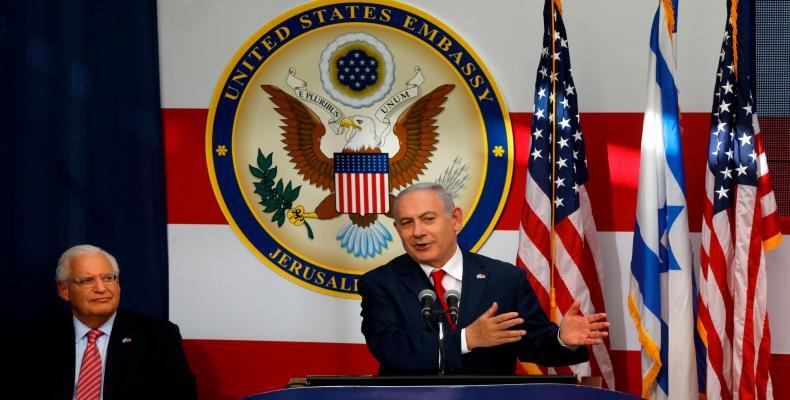London, May 15 (RHC)-- Both friends and foes of the United States have voiced criticism after Washington relocated its embassy in Israel from Tel Aviv to Jerusalem, saying the controversial move would ignite tensions across the Middle East region.
Britain in a statement on Monday reiterated that the administration of Prime Minister Theresa May had no plans to move its mission to Jerusalem and still disagreed with the U.S. decision. "We disagree with the U.S. decision to move its embassy to Jerusalem and recognize Jerusalem [al-Quds] as the Israeli capital before a final status agreement," a spokesman for May said in the statement. "The British embassy to Israel is based in Tel Aviv and we have no plans to move it."
France also spoke out against the U.S. move, saying along with many other critics that it violated "unambiguous" international law and UN Security Council resolutions. French Foreign Minister Jean-Yves Le Drian in a statement called on the Tel Aviv regime to act with caution in the use of force against Palestinian protesters. "France calls again for Israeli authorities to act with caution and restraint in the use of force, which must be strictly proportional," Le Drian said. He called on Israel “to protect civilians, in particular minors, and Palestinians' right to protest peacefully,” and said, "It is urgent to reinstate the conditions necessary for the pursuit of a peaceful solution in a regional context already marked by high tensions.”
Iran’s parliament speaker says U.S. and Israeli efforts to wreck a nuclear deal with Tehran and relocate American embassy to the occupied territories will not go unanswered.
Meanwhile, Russian Foreign Minister Sergei Lavrov reiterated Moscow's objection to the controversial U.S. move, saying Moscow "has several times offered a platform" for talks on the status of Jerusalem. "We firmly believe that it is inappropriate to unilaterally revise the decisions of the international community in this way," the top Russian diplomat said.
Turkish President Recep Tayyip Erdogan, during a visit to London, said that the United States had lost its role as mediator in the Middle East by moving its embassy to the occupied territories. "With its latest step America has chosen to be a part of the problem, not a solution, and lost its mediator role in the Middle East peace process," the Turkish president told the Chatham House international affairs think tank. "This decision... will increase tensions and ignite an even greater fire between communities," Erdogan added.
Turkish Prime Minister Binali Yildirim also accused the U.S. of sharing responsibility with Israel for a "vile massacre" along the Gaza border, during which dozens of Palestinians were killed by Israeli fire on Monday. The United States took its place without complaint alongside the Israeli regime in “this massacre of civilians and became a party to this crime against humanity," Yildirim told reporters in Ankara. Yildirim said that the move was "incompatible" with the U.S. acting as a mediator.
Turkish Deputy Prime Minister and government spokesman Bekir Bozdag wrote on Twitter that the violence came after "unjust and unlawful decisions," in reference to Washington’s relocation of its embassy. The U.S. administration is as “responsible” as the Israeli regime for this massacre, he said.
Moroccan King Mohammed VI also denounced Washington's "unilateral decision." In a letter to Palestinian President Mahmoud Abbas, the monarch wrote that he was "monitoring with concern" the U.S. recognition of Jerusalem al-Quds as the Israeli capital.
The Egyptian Foreign Ministry, in a statement, voiced "strong denunciation" of Israel's use of force against Palestinian civilians and said Cairo "totally supports the legitimate rights of the Palestinian people, and first and foremost its right to an independent state with East Jerusalem as its capital."
The Palestinian president, Mahmoud Abbas, who declared three days of mourning, also condemned Israeli "massacres" along the Gaza border after the regime's forces killed dozens of Palestinians during Monday's clashes and protests coinciding with the opening of the new US embassy. He said "the U.S. is no longer a mediator in the Middle East," and the new embassy was tantamount to "a new American settler outpost" in al-Quds.
Washington on Monday moved its embassy in Israel to Jerusalem after months of global outcry. In the hours leading up to the inauguration, Israeli troops engaged in clashes with Palestinians taking part in mass protests on the Gaza border.
Israeli gunfire killed over 60 Palestinians in the ongoing Monday clashes -- the highest toll in a single day since a series of protests demanding the right to return to ancestral homes began on March 30th. The embassy inauguration also coincided with the climax of a six-week demonstration on the 70th anniversary of Nakba Day (Day of Catastrophe), May 15, when Israel was created.
The occupied territories have witnessed new tensions ever since U.S. President Donald Trump on December 6, 2017 announced U.S. recognition of Jerusalem as Israel’s “capital” and said Washington would move its embassy to the city. The dramatic decision triggered demonstrations in the occupied Palestinian territories as well as Iran, Turkey, Egypt, Jordan, Tunisia, Algeria, Iraq, Morocco and other Muslim countries.
World leaders warn U.S. embassy relocation will escalate Mideast tension

Related Articles
Commentaries
MAKE A COMMENT
All fields requiredMore Views
- U.S. lawmakers propose withdrawing from United Nations, saying it no longer serves Washington's interests
- Brazil announces dates for BRICS summit
- Thousands take part in London rally against Donald Trump’s Gaza ownership plan
- Venezuelan government reveals terrorist plans dismantled before January 10th swearing-in of President Nicolas Maduro
- Cuban president congratulates new head of African Union Commission

